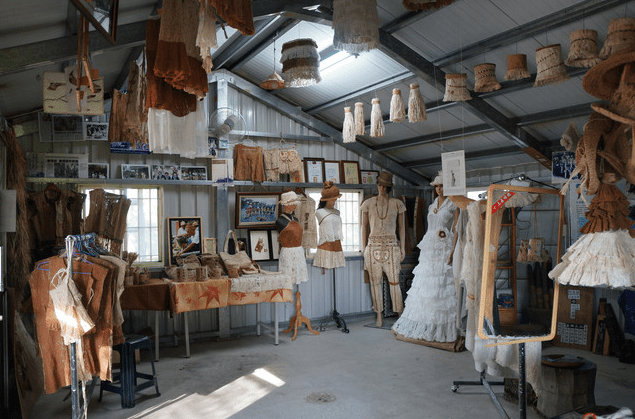
In recent years, people have become more aware of the importance of sustainable business practices. Wanting to maintain our current standard of living, protecting the environment for our children, and creating a better world for everyone isn’t some farfetched idealistic concept. In fact, everyone can help actualize these ideals by doing little things in our daily lives. In 2015, the UN announced the 2030 Sustainable Development Goals (UN SDGs), which include 17 specific objectives such as eradicating hunger, promoting gender equality, responsible production and consumption, and mitigating climate change. These have established clear goals and provided government agencies, private businesses, and the public with a guiding framework to achieve sustainability. In Taitung, the Panai FFaki’s Amis Barkcloth Culture Studio, has demonstrated the power of the UN SDGs by bringing the traditional art of Amis barkcloth clothing back to life.
Barkcloth was once a lost traditional indigenous craft. The Panai Faki’s Amis Barkcloth Culture Studio organizes barkcloth workshops that promote this type of traditional Amis craft, which allows more people to get to know the culture surrounding traditional indigenous crafts in general. Besides breathing life into the local tourism industry, these workshops also demonstrate a new iteration of traditional indigenous culture. This has allowed more people to understand barkcloth culture so it can be passed on to the next generation. Such workshops also help foster sustained, inclusive and sustainable economic growth (UN SDG 8: Decent Work and Economic Growth), build resilient infrastructure and promote inclusive and sustainable industrialization (UN SDG 9: Industry, Innovation and Infrastructure), and protect, restore, and promote the sustainable use of terrestrial ecosystems (UN SDG 15: Life on Land). Ultimately, the UN SDGs are a natural extension of the lifestyle that is already well-established in Taitung.
In April 2008, the former chief of Dulan, Shen Taimu (Banai Tadirekong in Amis), founded Panai Faki’s Amis Barkcloth Culture Studio. When he was chief, Shen Taimu hoped to do something meaningful for the tribe and future generations, and thus began researching the lost art of making barkcloth, which is an indispensable part of traditional Amis clothing. Using mulberry and ficus bark, Shen Taimu has incorporated the creativity of modern life to make unique barkcloth clothing. As such, Shen Taimu has garnered attention from the foreign media and is often invited to give demonstrations on making barkcloth outside of Taitung.
The workshops at Panai Faki’s Amis Barkcloth Culture Studio are around two and a half hours long. The workshop includes an introduction to traditional Amis utensils, a tour of the studio to look at clothes, hats, and art pieces made from barkcloth, a presentation on the making and uses of barkcloth as well as hands-on sessions on how to peel bark off of a tree, pound tree bark, and make hats, bags and sun-blocking baseball hats. However, making a barkcloth bag or baseball hat takes around three to five days. If guests are short on time, they can simply buy one from the studio and take it home the same day.
Besides making traditional clothing, Panai Faki’s Amis Barkcloth Culture Studio focuses on incorporating barkcloth crafts into modern life, for example, by making barkcloth hats and wedding dresses. One of their white wedding dresses takes over a year to make, which involves a process of collecting bark, which all must have a similar pattern and texture, sewing, and finally incorporating in cloth with bleached tree bark. The rustic feel of barkcloth sets this wedding dress apart from one you’d find in your everyday store. As such, barkcloth wedding dresses have become a hallmark of indigenous craftsmanship.
The main reason behind founding Panai Faki’s Amis Barkcloth Culture Studio was a deep sense of purpose to carry on indigenous culture. The aim of keeping an entire set of barkcloth clothes in the studio, which is for display purposes only and not for sale, is to preserve and carry on this traditional craft. Other items, such as Amis bags and hats, are available for purchase. By combining barkcloth with different materials while carrying on tradition and innovating, in the future, Panai Faki’s Amis Barkcloth Culture Studio plans to use barkcloth to make useful products such as pen holders, lamps, and wallets.
The next time you have the chance to go to Dulan, make sure you book a tour of the studio to see the east coast’s one-and-only barkcloth, participate in a workshop, get a chance to pound bark, and experience the joy of making barkcloth. And remember, every action and decision we make can bring us closer to the possibility of achieving a sustainable future.
Address: No. 445-13, Neighborhood 43, Dulan Village, Donghe Township, Taitung County
Phone Number: 089-531-970, 089-530-428
Chief Banai Tadirekong’s Cellphone Number: 0911-811970Website: Facebook Page
Learn more about and experience Austronesian culture.




